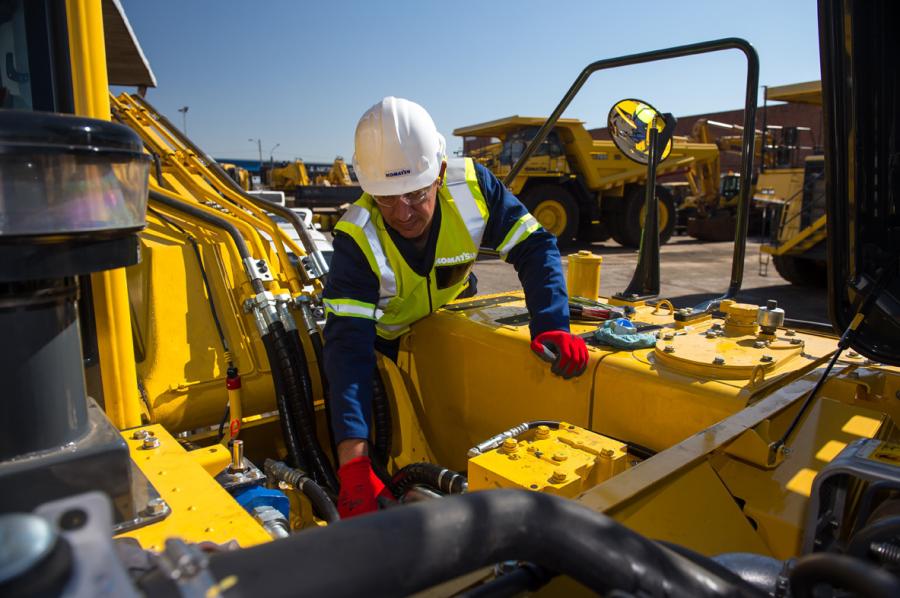Regardless of how talented a crew you have or how strategically planned your projects are, without your tools functioning at their optimum, you will start losing money – and fast.
Your busiest time of year is approaching for which you know you'll only be as good as your machinery.
Regardless of how talented a crew you have or how strategically planned your projects are, without your tools functioning at their optimum, you will start losing money – and fast. Excavators, having improved dramatically over the last decade are the new workhorses. With enhanced systems and versatility, excavators have the resilience and capability of multiple pieces of equipment in one.
However, with increased demands and expectations, dedicated maintenance for your excavator must be provisioned for, and the following tips explain key requirements to keep one of your more important machines in optimum condition.
1) Read the Instructions
Manufacturer manuals should always be the first port of call. Regardless of how tempting it may be to bypass the instructions, reviewing your excavator's operation and maintenance manual will guide you through the features, instrumentation, service rosters and any official recommendations you should be aware of. With this information literally within the palm of your hands, you could be saving yourself time, effort and most importantly expense by referring to it regularly.
2) Lubricant is Everything
Ensure you and your operating crew follows a set daily routine of checking fluids for substantial levels or leaks such as the coolant, hydraulic liquid and engine oil. Clear adherence to the operator's specifications in terms of what type of liquids and lubricants to use is imperative to keep your excavator working at its best.
Today's excavators are increasingly compact with engines that comply with strict regulations regarding emissions. This means that many have their own unique lubrication requirements which provide for the correct operation of exhaust post-treatment systems. Matching the right oils to the right engines is the pinnacle of protecting the engine.
Furthermore, general lubrication at frequent intervals is important, as is making sure these lubricants are administered at correct temperatures and locations. Many manufacturers suggest that lithium-based grease should be applied at all main pivot-points – pay particular attention to cylinders, blades, arms and slew bearing parts.
Cleanliness is everything, so be sure to keep all openings clear from dirt and debris, and be especially diligent to avoid any foreign particles from entering the internal system.
3) Filter it Out
Filters directly affect your excavator's performance, and more critically when they are clogged or noticeably unkempt. There are numerous filters on your excavator which protect your engine and hydraulic systems among others, however each system may have slightly differing service requirements so do refer once again to your manufacturer's manual to be fully informed.
4) Protect Through Fuel
It won't come as a surprise that keeping your excavator in top condition comes with the condition of using good quality fuel. High quality No.2 or No.1 diesel will most likely suit your machine best, however if in colder temperatures, anti-gelling blends may be better. At the very least, extra low sulfur diesel is the minimum requirement to minimize emissions.
5) Take a Look Below
The all-important undercarriage. Daily cleaning, proper tension and general inspection of your excavator's undercarriage will extend your machine's lifespan considerably and also prevent premature wear.
Everyday post use, the operating team should set aside some time to clean all dirt buildup from the undercarriage with shovels or pressure washers. Compacted debris actually adds to fuel consumption through the added unnecessary weight, and in cooler temperatures this dirt can actually freeze and seize up components, such as the rollers.
Daily inspection of track bolts, chains, shoes and tension will help anticipate any issues before they develop into serious problems leading to downtime. Proper track tension in particular avoids accelerated wear (if too tight), and de-tracking (if too loose).
6) Maintenance Includes Safety
Excavators are some of the more powerful machines onsite, therefore taking precautions to secure a safe environment before using them is integral to responsible maintenance and operation. If, for example, you're working within a residential area, ensure your area of operation is clearly laid out, and if you're remotely unsure of utility lines, call 811 before digging deep.
Of course, use of seatbelts and widely acknowledged safety drills should be part of the team's daily routine when using your excavator.
7) Capitalize on Telematics
Telematics – machine-to-machine communication – with a management system can help you keep ahead of your excavator's maintenance obligations. Using this type of computer science can help check engine codes and generally improve maintenance by removing the guesswork factor from your conventional maintenance strategy.
Your excavator is most likely one of your most important investments as its versatility and resilience cuts down on the bottom line and generates more revenue. Be kind and respectful to it by committing to a daily routine of diligent maintenance and some love!
Megan Wild writes is a freelance writer who specializes in construction. You can find some of her work on sites like Engineering.com, Procore, Construction Equipment Guide, and more. Follow her on Twitter @Megan_Wild.
Today's top stories











